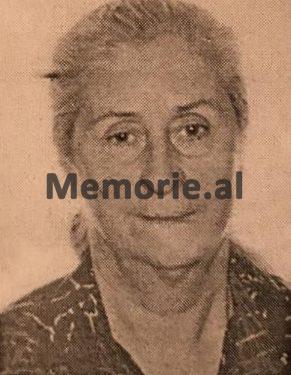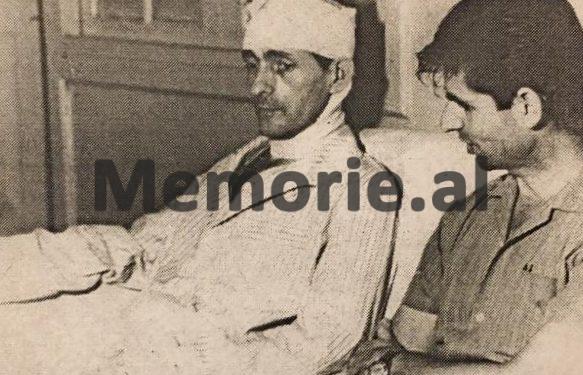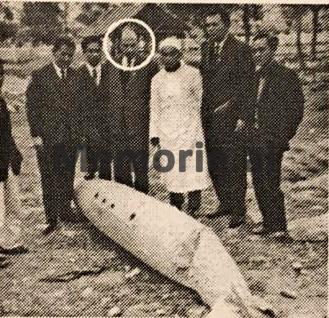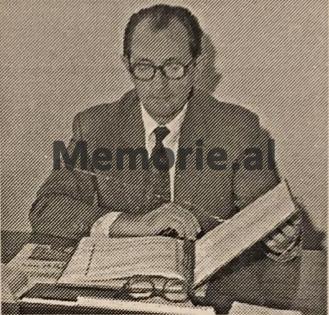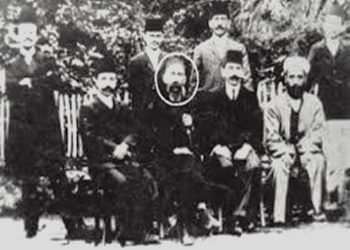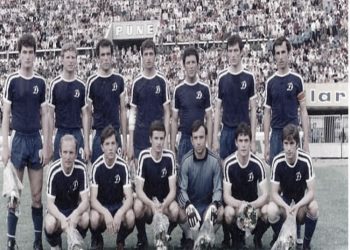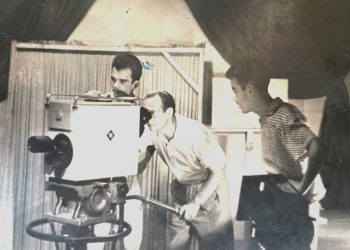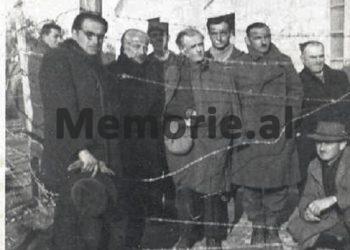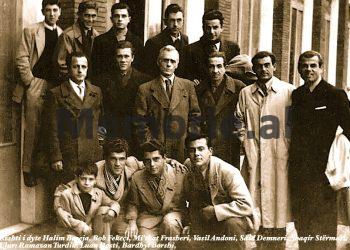Dashnor Kaloçi
Memorie.al publishes the unknown story of the staff of the Albanian embassy in Hanoi, North Vietnam in the early 1970s, which had to face many difficulties since its accommodation at the headquarters of our diplomatic mission. living in attics and basements, where as furniture there was only a bed and a closet, lack of food, which they provided by buying in the market stalls and to the villagers who came to sell their products in the cities, as well as restrictions on communications with their counterparts from foreign diplomatic missions, where the Russians were not given a hand in various receptions, turning their backs or pretending to fix their socks. The rare testimony of Mrs. Adika Dajçi Rrahmanaj, the wife of the former diplomat, Qemal Rrahmanaj, who served for five years through numerous difficulties at the Albanian embassy in that remote Asian communist country, risking dozens of times his and his family’s lives from the American bombing. The incident of October 11, 1972, where Rrahmanaj, who played the role of ambassador, was seriously injured together with his subordinate, diplomat Maxhun Peka, while they were on a working visit to the French embassy in Hano, where a US aviation bomb exploded, the French ambassador with his wife and four employees of the service of that diplomatic mission were killed. How did the Albanian press cover that serious event and the “reward” that diplomat Rrahmanaj received when he returned to Tirana, which was removed from the Ministry of Foreign Affairs and sent to a simple secretary in a neighborhood of the capital.
According to the announcement of the Albanian Telegraphic Agency, which referred to some of the most famous and prestigious telegraph agencies in the world, it was announced that at 11:30 a.m. that day, according to the local time of the capital of North Vietnam, Hanoi, by The US diplomat Qemal Rahmanaj, who was on a working visit to the permanent headquarters of the French government accredited in that city, was seriously injured in the airstrikes of the American forces. Likewise, in the sensational news, which spread with dizzying speed throughout the country, through the waves of Radio Tirana (the only radio that the Albanian state had at that time), it became known that in the general headquarters of the government French in Hanoi, in addition to the Albanian diplomat Qemal Rahmanaj, who was seriously injured, six people were killed, including the French ambassador and his wife. But what is the truth about that event that took place on October 11, 1972 in that distant Asian country led by the communist government of Ho Shi Min, which official Tirana of that time used with all its propaganda arsenal, to curse and unmask American imperialism ?! To learn more from the announcements, the protest notes, the statements and the news that were given to the Albanian press at that time about that unusual event, we turned to the family of the former diplomat Qemal Rahmanaj, who has passed away. 20 years ago. His wife, Adika (Dajçi), a noble woman originally from the Gjakova Highlands, who has followed her husband from behind in all the vicissitudes and troubles of life, welcomed us with great kindness in the simple apartment he has left as a “heritage”, there on the third floor of a very old building, very close to the center of Tirana, on the left of the boulevard to lead to the square “Avni Rustemi”. With a memory to envy everyone, Adika Rahmanaj, brings us in time that distant event, telling us in detail and detail about everything we ask. In addition to her testimonies, she makes available to us the memories of her husband, written by his hand, shortly before he passed away, as well as photo albums, which together complete the whole framework of their lives. , both with moments of brilliance and with endless vicissitudes.
Mrs. Adika, when did you first go to Vietnam with your husband and under what conditions did you meet there?
In 1970, when we moved to Hanoi, we settled inside the building of our embassy, which was a two-story building with an unoccupied attic and a basement, which was often used for housing by our staff. The apartment where we lived for five years consisted of a room and a small annex, and as furniture there was only one bed, a closet and an air conditioner. Together with us, the embassy was inhabited by the digitist, while the house of the ambassador and the driver, which were a little better, were located not far from us. Another problem we faced was food, as there was no food in Hanoi and the people suffered greatly from its lack. But for us foreigners and personalities of the country, a special shop was opened, but even there you often find nothing. To buy any kg. meat or any other food, you had to order a few days ago. Based on this fact, we bought food at the street stalls or at the villagers who came to town to sell the little produce they had. Only our embassy suffered from a lack of food, as those from other countries were either brought there or bought in Hong Kong. All that I said was missing from the Vietnamese people, who were living in extreme hardship. To give you a clearer picture of the situation in Vietnam at the time, I am telling you that: in the largest warehouse in Hanoi, children played with a ball, as there was nothing inside. There you could only find blankets of the “Stalin” textile factory in Tirana, which they had received as aid from Albania. And to all these difficulties of life was added the most terrible thing that prevailed there, the bombing of the Americans.
How do you remember the American bombings and how did you experience them?
Since our visit to Hanoi in 1970, we have been given the necessary instructions on how to protect ourselves and how to act in the event of bombings, which were daily, night and day. Their danger was instantaneous, and when the bombing of the planes began, we went out into the yard and counted the bombs that looked like beads. The heaviest bombing of the Americans began in March 1972 and they became a sign of pressure to sign the peace agreement in Paris. The start of the bombardment was announced by the many sirens that were placed at each end of the capital Hanoi, and upon hearing their signal, we first turned off the lights (if it was night) and dressed or half dressed as we were, went down the stairs. slipped on their railings, to be immediately inserted into the rifuxhot located inside the embassy yard. Rifugho were called shelters (tunnels) that were built specifically to protect themselves from bombing. When the bombings hit us on the road, we immediately got into the water barrels that were on the side of the road. Slowly we became specialists in aircraft and recognized their noise every time they flew over Hanoi. The B-52s made a lot of noise, while the Fantomes were elusive to the radars, and when they flew, the sirens did not fall.
Did the Vietnamese authorities take measures to protect your life from bombing?
The building of our embassy was located very close to the Ministry of Foreign Affairs and near us was a military unit, which had the task of protecting the lives of the personalities and staff of the embassies. As soon as the alarm sirens sounded, the soldiers came to us with rifles in their hands, but the deserters had nothing to do with the American plane bombs. Once the American bombs fell near the train station, where the third secretary of our embassy, Maxhun Peka, lived, with his wife and young daughter. He was seriously endangered by them and from that day on, he came and settled in the basement of our embassy.
What were the targets most targeted by the Americans in the bombing of Hanoi?
Their bombs fell everywhere in the city, but they aimed more at a large dam, which was not far from our embassy. That dam also served as a bridge, and the Vietnamese told us that if it was destroyed by bombs, the whole city of Hanoi would be flooded. The Americans hit a lot there and once a B-52 plane crashed there, which we went and saw up close. Since the destruction of this dam was expected hour by hour, all other embassies had taken measures, keeping boats in their headquarters, only we did not have. The American plane bombs caused many casualties and the hospitals were full, with hundreds injured. In Hanoi you can rarely find any Vietnamese who had no white headscarf tied around their heads, which was a sign of mourning, indicating that a relative had died. In March 1972, when, as I said before, the bombings became more frequent, with the exception of the Albanian embassy, all the states withdrew the staff of their embassies from Vietnam. North Korea was the last to withdraw its embassy and only we remained there, as we were told we had to stay on top of the task. At that time there was grass in all the embassies, because there was no man standing. Then, when talks began at the Paris Peace Conference, the bombings ceased and the embassies returned to Hanoi.
What were your relations with the staff of other embassies and the Vietnamese people?
We had the right relationship with other embassies and went and came on occasions of various receptions and celebrations. Only with the Russians were we forbidden to communicate, and when we encountered them at a reception, we turned our backs or pretended to adjust our socks so as not to give them a hand. They understood our position and just laughed. One time, while waiting, I accidentally shook hands with a Russian woman, but thankfully they didn’t see me, because it could have been a big problem. Even with the common Vietnamese people we did well and they respected us a lot. The Vietnamese were a simple and allegorical people. Women were very happy to keep themselves and often they were bombarded by hairdressers fixing their hair.
How do you remember the injury of your husband, Qemali?
It was October 11, 1972, and that day Qemali left for the headquarters of the French embassy, where he had a working meeting. An Albanian student (three of them all from Hanoi) came to our house, there at the embassy, and we begged him to stay for lunch. He did not stay, and when I went out to escort him to the courtyard, I saw the embassy car, which was almost completely destroyed. When I saw the car in the yard in that condition, I was horrified. The drivers had taken Qemali to the hospital and had come there to pick up Maxhun and take him to the hospital in the same car, which was surprisingly able to walk. I went with Maxhun. We found Qemali in the operating room, after he had received 28 small wounds and the doctors were cleaning them. Qemali was admitted to the hospital as a foreigner, so that no one would be admitted to the hospital without the bombing being completed.
How did Qemali’s injury happen?
Qemali had gone to the general headquarters of the French delegation five minutes before the meeting he had with the chairman of that delegation, Mr. Pierre Susin, and while he was waiting in the waiting room, three bombs fell on the French headquarters, and only one exploded. The bombing destroyed part of the building, killing the French ambassador and his wife and four Vietnamese service workers. As soon as the bomb fell, Qemali immediately jumped under the table and there received a heavy blow to the neck aorta from a shell shell. After blocking the wound with a handkerchief, through the ruins of the building he was able to get out into the yard, where his driver was waiting for him with all the new driver who had come that day to take the task. After that, they immediately took him and sent him to the hospital, where Qemali stayed for ten days, under the constant care of doctors. Then, for another two months until January 2, 1973, doctors came and treated him at home, or Qemali went to the hospital on his own. Both when he was in the hospital and when he was at home, Qemali was visited by many Vietnamese personalities and almost all the staff of the foreign embassies in Hanoi. Qemali was also visited by the French ambassador accredited in Beijing.
After that event, did Qemal ask to leave Hanoi?
I wanted to run away, while Qemali didn’t even think about it.
When Qemali finished his diplomatic service in Hanoi and returned to Tirana, what did they say to the Foreign Ministry, did they give him any reward?
The reward they gave Qemali when we returned to Tirana was to leave the ministry and be sent for six months as a simple secretary in a neighborhood. Qemali was then taken to the Ministry of Foreign Trade, where he worked as chief of protocol until 1987, when he retired.
How do you remember today the time you lived in Hanoi, do you miss it?
Although we have lived through many difficulties, as I told you, I remember that time with great longing. If given the chance, I would go again with great pleasure. Vietnamese are a wonderful people.
Albanian government statement on the event with Ambassador Rahmanaj in Hanoi on October 11, 1972
The event of October 11, 1972, in the capital of North Vietnam, where the Albanian diplomat Qemal Rahmanaj was seriously injured by the American bombing, while he was on a working visit to the permanent headquarters of the French government in Hanoi, was followed. with a great echo from the press of official Tirana. Many announcements, statements, protest notes and various news were published in the newspaper “Zeri i Popullit” of those days, some of which we are publishing abbreviated below.
Declaration of the Government of the People’s Republic of Albania Tirana October 12, 1972.
The brutal bombing on October 11, 1972 at noon in the most populated neighborhoods in the center and suburbs of the capital of the Democratic Republic of Vietnam, Hanoi, as well as in the neighborhood where the diplomatic missions are located, caused numerous civilian casualties and extensive damage. material. During this bombardment, the headquarters of the French general delegation was destroyed, where many people were found dead and seriously injured. The charge d’affaires, a.i. of the People’s Republic of Albania in the People’s Republic of Vietnam, Qemal Rahmanaj, who during this time was visiting the headquarters of the French general delegation, and the driver of the Albanian embassy, were injured by the bomb blast.
American imperialists bomb the center of Hanoi. The charge d’affaires of the Republic of Albania was seriously injured
Tirana, October 12. The VNA agency reports that the American imperialists sent many planes yesterday, which bombed regions with a dense population of the center of Hano. They dropped 60 bombs and many rockets there, killing and injuring many civilians and destroying many homes. It is underlined that the American bombs and missiles almost completely destroyed the office of the French general delegation in Hanoi, seriously injured the French general delegate, killed and wounded a number of French and Vietnamese officials. In this attack, the person in charge of work a.i. was also seriously injured. The People’s Republic of Albania in Hanoi, Qemal Rahmanaj, who was there to visit, as well as the driver of the Albanian embassy. (ATA)
Statement of the Albanian delegation at the session of the UN General Assembly
Tirana, October 14, 1972. Comrade Reis Malile read to the First UN Political Commission the statement of the Albanian delegation at the 27th session of the UN General Assembly regarding the recent bombings in Hanoi, the capital of North Vietnam. which states:
“On October 11, the American imperialists bombed the RD of Vietnam, where among the victims of the civilian population and members of the diplomatic corps, the charge d’affaires a.i. of the Embassy of the Republic of Albania in Hanoi, Qemal Rahmanaj, and the clerk of the embassy, Nazmi Cani ”.
Rahmanaj’s 30-year career and vicissitudes in Belgrade, Prague and Hanoi
Autobiography
Shortly before he passed away, the well-known former Albanian diplomat, Qemal Rahmanaj, who was well acquainted with the insidious mechanisms of that state that served him for years with honesty and devotion, left his family with an autobiography written with his hand, where among other things it is said: “I, the signatory Qemal Rahmanaj, the son of Arif and Hamdija, born in Velika Dibra on 15.V.1926 and resident in the city of Tirana, I graduated from the Faculty of Political Science Law at the University of Tirana, where I graduated as a lawyer. I am a veteran of the Antifascist National Liberation War against the Nazi occupiers and have been retired since 1987. From the beginning, I connected and supported the liberation war of our people against the Nazi-fascist occupiers, initially with illegal activities in Tirana, participating in youth gatherings, distributing tracts, collecting aid, and in the second half of 1944 I became a partisan by joining. in the ranks of the First Assault Brigade. After the liberation, with the creation of the People’s Defense Division, I joined his ranks in the Tirana ward, where I dealt with the youth. In 1945 I was admitted to the party. For my active and organized participation in the War, I was decorated with the Medal of “Memory”, “Courage” and “Liberation”. I was also decorated with the “Work Medal” with the motivation: “For tireless work in the implementation of assigned tasks, becoming an example for others.” In 1946, being effective of the Command of the People’s Defense Division, I was informed of the appointment as secretary (clerk) of the military attaché of our embassy in Belgrade, where I also started working. In 1947, some staff changes were made to the embassy, where I was discharged from the army and continued to work at that embassy. A few months later, the Ministry of Foreign Affairs communicated to me the appointment of the Secretary of the Embassy in Belgrade. With this appointment I started working as a career diplomat, which I continued for 30 years without interruption. As we know in 1948, our country’s relations with Yugoslavia deteriorated. At this time the Yugoslav government took a series of strict measures against the staff of our embassy, reaching the point of organizing, arresting and imprisoning an embassy employee. In addition to these actions, from the early 1950s onwards, the Yugoslav government decided to deport me from Yugoslavia as an undesirable person. When I returned home, I started working at the Ministry of Foreign Affairs. With some arrangements made in 1953, I was appointed Chief Executive Officer covering the consular sector, staff, finance and administration. I remained in this position until the end of 1959. In May 1960, I was appointed First Secretary of our Embassy in Czechoslovakia. In this way I started working in early June, a time when, as is well known, the meeting of the Communist and Workers’ Parties in Bucharest ended.
In the situation that arose, the Czechoslovak government gradually began to pursue various persecutions and provocations against the staff of our embassy. In the context of these attitudes that began to be held against us, in the days that followed, the Czechoslovak government expelled our ambassador from the country. At our embassy in Prague, I stayed until the end of 1963, and then I returned home, where there were staff reductions. At this time I started working as a specialist in the First Directorate of the Ministry of Foreign Affairs, where I covered: Hungary, Czechoslovakia, the German Democratic Republic and North Korea. In 1970, I was appointed First Secretary of the Embassy of Albania in Vietnam, where I remained until the end of 1974. In 1972, in the absence of the ambassador, I exercised the functions of the charge d’affaires, a.i. of our embassy. In January 1978, by decision of the Council of Ministers, I was appointed Chairman of the Protocol and Visas Branch at the Ministry of Foreign Affairs, which had just been established and whose branch functioned was to receive government delegations at all levels. came to our country to negotiate and sign government agreements on the exchange of goods between the two countries, as well as the approval of entry visas to our country of these delegations, or various groups and persons of commercial firms that came to conclude contracts with enterprises. our trade. I worked here until 1987, when I retired. My 30 years of uninterrupted activity in the Ministry of Foreign Affairs, and our embassies in Belgrade, Prague and Hanoi, has been a work done with conscience, honesty and self-sacrifice. Throughout my career as a diplomat, I have tried to represent my country with dignity and correctness. I have tried to defend the right attitudes of the government and our state in any circumstance, without being afraid of the consequences that I could have “./Memorie.al




